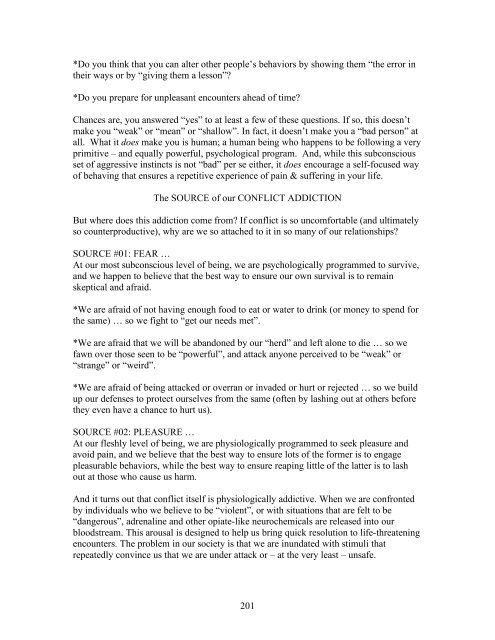Licking the Razor's Edge (2015)
Recognizing the hidden addictions that bind you, … to then set your True Self free
Recognizing the hidden addictions that bind you,
… to then set your True Self free
Create successful ePaper yourself
Turn your PDF publications into a flip-book with our unique Google optimized e-Paper software.
*Do you think that you can alter o<strong>the</strong>r people’s behaviors by showing <strong>the</strong>m “<strong>the</strong> error in<br />
<strong>the</strong>ir ways or by “giving <strong>the</strong>m a lesson”?<br />
*Do you prepare for unpleasant encounters ahead of time?<br />
Chances are, you answered “yes” to at least a few of <strong>the</strong>se questions. If so, this doesn’t<br />
make you “weak” or “mean” or “shallow”. In fact, it doesn’t make you a “bad person” at<br />
all. What it does make you is human; a human being who happens to be following a very<br />
primitive – and equally powerful, psychological program. And, while this subconscious<br />
set of aggressive instincts is not “bad” per se ei<strong>the</strong>r, it does encourage a self-focused way<br />
of behaving that ensures a repetitive experience of pain & suffering in your life.<br />
The SOURCE of our CONFLICT ADDICTION<br />
But where does this addiction come from? If conflict is so uncomfortable (and ultimately<br />
so counterproductive), why are we so attached to it in so many of our relationships?<br />
SOURCE #01: FEAR …<br />
At our most subconscious level of being, we are psychologically programmed to survive,<br />
and we happen to believe that <strong>the</strong> best way to ensure our own survival is to remain<br />
skeptical and afraid.<br />
*We are afraid of not having enough food to eat or water to drink (or money to spend for<br />
<strong>the</strong> same) … so we fight to “get our needs met”.<br />
*We are afraid that we will be abandoned by our “herd” and left alone to die … so we<br />
fawn over those seen to be “powerful”, and attack anyone perceived to be “weak” or<br />
“strange” or “weird”.<br />
*We are afraid of being attacked or overran or invaded or hurt or rejected … so we build<br />
up our defenses to protect ourselves from <strong>the</strong> same (often by lashing out at o<strong>the</strong>rs before<br />
<strong>the</strong>y even have a chance to hurt us).<br />
SOURCE #02: PLEASURE …<br />
At our fleshly level of being, we are physiologically programmed to seek pleasure and<br />
avoid pain, and we believe that <strong>the</strong> best way to ensure lots of <strong>the</strong> former is to engage<br />
pleasurable behaviors, while <strong>the</strong> best way to ensure reaping little of <strong>the</strong> latter is to lash<br />
out at those who cause us harm.<br />
And it turns out that conflict itself is physiologically addictive. When we are confronted<br />
by individuals who we believe to be “violent”, or with situations that are felt to be<br />
“dangerous”, adrenaline and o<strong>the</strong>r opiate-like neurochemicals are released into our<br />
bloodstream. This arousal is designed to help us bring quick resolution to life-threatening<br />
encounters. The problem in our society is that we are inundated with stimuli that<br />
repeatedly convince us that we are under attack or – at <strong>the</strong> very least – unsafe.<br />
201


















